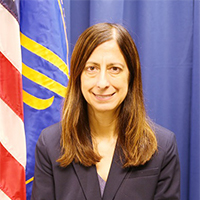Domestic and intimate partner violence (IPV) is a significant public health problem that can have devastating effects on individuals, families and communities. American Indians and Alaska Natives experience rape, physical violence and stalking by an intimate partner at higher rates than the general U.S. population, however the impact of IPV is not fully appreciated as social barriers such as privacy, guilt, shame and fear inhibit reporting rates.
The Presidential Proclamation naming October 2016 as National Domestic Violence Awareness Month supports healing from domestic violence and states that "we must ensure that survivors and their families have access to the resources, care and support they need to do so." The White House has established a new North American Working Group on Violence against Indigenous Women and Girls and the Indian Health Service (IHS) was pleased to participate in the first meeting of this working group which occurred at the White House on October 14, 2016.
IPV has been correlated with an increased risk of heart disease, asthma, chronic pain syndromes, gastrointestinal disorders, sexually transmitted infections, gynecological and pregnancy complications. There are emotional and psychological consequences such as depression, anxiety, eating disorders and post-traumatic stress disorder. Adverse health behaviors associated with IPV include high-risk sexual activity, alcohol and substance use and an increased risk for suicide.
The highest rates of IPV occur in women of childbearing age, but early screening and detection of IPV along with appropriate intervention may increase the safety of these women. The impact on children exposed to IPV has wide implications including increased risk for physical, sexual, emotional neglect, harm and death.
To respond to this public health problem and provide access to care, IHS issued its first standalone policy on Intimate Partner Violence. The purpose of the policy is to identify victims of IPV and intervene on their behalf within a system of medical care and referral that is patient-centered, culturally sensitive and trauma-informed. This policy establishes uniform clinical care guidelines for providers on identifying and responding to patients presenting to IHS healthcare facilities, with specific training on the forensic healthcare response to IPV.
IHS' work on IPV aligns with the priorities of the President. In June of this year President Obama traveled to Ottawa, Canada, for the North American Leaders' Summit (NALS), where he met with the Prime Minister of Canada, Justin Trudeau, and the President of Mexico, Enrique Peña Nieto, to discuss key priorities aimed at creating a safe and secure future for the citizens of all three countries. Among the many commitments announced at NALS was a tri-lateral commitment to address the scourge of violence against indigenous women and girls that exists across North America. The White House included that commitment under the "security and defense" initiative, to underscore that women's security is integral to national security.
Across Canada, the U.S. and Mexico, indigenous women and girls face alarmingly high levels of violence and often lack access to justice, health care and social services. In May 2016, the magnitude of this violence in the U.S. was driven home by a new report from the National Institute of Justice with staggering statistics. The researchers found that more than 84 percent of Alaska Native and American Indian women had experienced some form of violence in their lifetimes: 66 percent experienced psychological violence, 56 percent experienced sexual violence, 55 percent experienced physical violence from an intimate partner and 49 percent experienced stalking. Despite the grave need for support and protection from this violence, 38 percent of Alaska Native and American Indian female victims were unable to access legal, medical and other services. Read more on the White House blog .
Domestic and sexual violence are issues that no one should have to experience but if we learn the warning signs, can provide support and are able to reach out to those that need it most, we can impact the cycle of violence.
Ms. Smith, a member of the Cherokee Nation, leads IHS, a nationwide health care delivery program responsible for providing preventive, curative and community health care to approximately 2.2 million American Indians and Alaska Natives.



